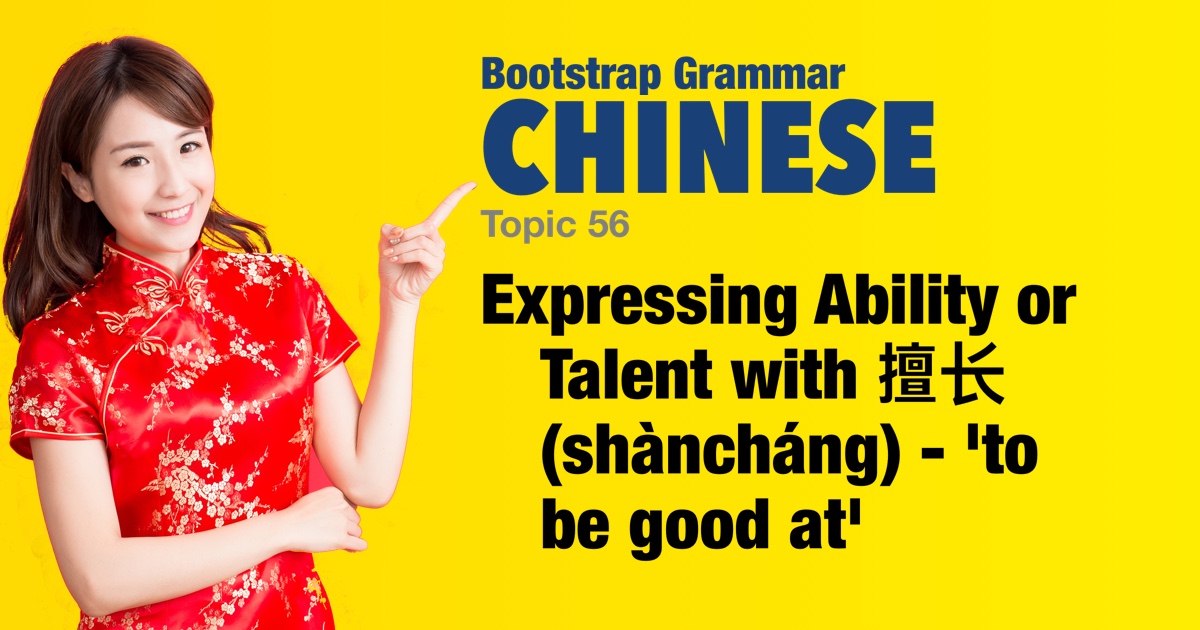Chinese grammar - Expressing Ability or Talent with 擅长 (shàncháng) - 'to be good at' |
|||
|
|||
The Chinese verb 擅长 (shàncháng) is used to express that someone is skilled at or excels in a particular activity or subject. The pattern is: [subject] + 擅长 + [activity/skill]. |
| Examples: | |
|
我擅长画画。
wǒ shàncháng huàhuà. I am good at drawing.
|
|
|
他擅长篮球。
tā shàncháng lánqiú. He is good at basketball.
|
|
|
你擅长什么?
nǐ shàncháng shénme? What are you good at? |
|
|
她擅长写作。
tā shàncháng xiězuò. She is good at writing.
|
|
|
我们擅长做饭。
wǒmen shàncháng zuòfàn. We are good at cooking.
|
|
|
我虽然不擅长数学,但是我很擅长音乐。
wǒ suīrán bú shàncháng shùxué,#dànshì wǒ hěn shàncháng yīnyuè. Although I am not good at math, I am very good at music.
|
|
|
他擅长画画,尤其是风景画。
tā shàncháng huàhuà,#yóuqí shì fēngjǐnghuà. He is good at drawing, especially landscapes.
|
|
|
你们如果擅长做饭,我们就可以一起开一家餐馆。
nǐmen rúguǒ shàncháng zuòfàn,#wǒmen jiù kéyǐ yìqǐ kāi yì jiā cānguǎn. If you are good at cooking, we can open a restaurant together.
|
|
|
她不仅擅长唱歌,而且她还会弹钢琴。
tā bù jǐn shàncháng chànggē,#érqiě tā hái huì tán#gāngqín. She is not only good at singing, but she can also play the piano.
|
|
|
我老师在学生中非常受欢迎,因为她擅长教学而且很耐心。
wǒ lǎoshī zài xuéshēng zhōng fēicháng shòu#huānyíng,#yīnwèi tā shàncháng jiàoxué érqiě hěn nàixīn. My teacher is very popular among students because she is good at teaching and very patient.
|
|
|
我朋友们擅长表演,特别是舞台剧。
wǒ péngyou men shàncháng biǎoyǎn,#tèbié shì wǔtáijù. My friends are good at acting, especially stage plays.
|
|
|
你觉得他擅长解决问题吗?我觉得他不太擅长这个。
nǐ juéde tā shàncháng jiějué wèntí ma? wǒ juéde tā bútài shàncháng zhège. Do you think he is good at solving problems? I think he is not very good at this.
|
|
|
他擅长电脑技术,所以他在公司里负责网络安全。
tā shàncháng diànnǎo jìshù,#suǒyǐ tā zài gōngsī lǐ fùzé wǎngluò ānquán. He is good at computer technology, so he is responsible for network security in the company.
|
|
|
如果你擅长艺术,你应该考虑去学设计。
rúguǒ nǐ shàncháng yìshù,#nǐ yīnggāi kǎolǜ qù xué shèjì. If you are good at art, you should consider studying design.
|
|
|
她擅长语言学习,尤其是中文。
tā shàncháng yǔyán xuéxí,#yóuqí shì zhōngwén. She is good at learning languages, especially Chinese. |
|
 |
|



